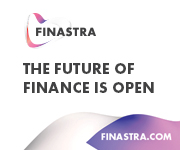|
This ABA Banking Journal newsletter is a free, twice-monthly supplement to the ABA Banking Journal magazine intended to help you stay on top of industry and policy news.
You can also stay abreast of banking news by visiting aba.com/BankingJournal, home to ABA Daily Newsbytes stories, digital exclusives, the ABA Banking Journal Podcast and more.
Tthe more I’ve learned about banking history, the more I’ve found that our field provides ample opportunities for young women and men in the early parts of their careers for incredible achievements. As you’ll see in this article, men and women under 40 pioneered numerous conveniences and innovations, from savings banks to data-driven lending and from traveler’s cheques to home computer banking. (ABA Banking Journal)
|
American confidence in banks increased in 2017, according to Gallup’s annual "Confidence in Institutions" survey. Thirty-two percent of Americans reported "a great deal" or "quite a lot" of confidence in banks, up five points from last year, and up 11 points from the record low notched in 2012. Confidence in banks peaked in 2004, when 53 percent expressed confidence in them. (ABA Banking Journal)
|
The Labor Department released the June hiring and unemployment figures this morning. This is the latest official snapshot of the state of the American economy. 222,000 jobs were added last month, compared to Wall Street economists' expected employment gains of 175,000. The unemployment rate was 4.4 percent, similar to May’s jobless rate of 4.3 percent. The average hourly wage grew by 2.5 percent from a year earlier and the labor-force participation rate inched up to 62.8 percent, from 62.7 percent. (New York Times)
|
Payments between individuals and companies will be a lot more mobile in the future, according to consumers. Turns out, the majority of consumers (who have grown used to being paid via direct deposit or electronic transfer anyway) believe that future payments between consumers and corporations will be exchanged via mobile app, according to a survey released recently by B2B invoicing and payments provider Viewpost. (Bank Innovation)
|
Big U.S. banks plan to increase dividend payouts and share buybacks to their highest levels in years after the Federal Reserve on Wednesday approved capital plans for all 34 firms taking part in its annual stress tests. The approvals—the first time since the annual tests began in 2011 that all firms got passing grades—reflect a turning point for big financial institutions that have been shackled by tighter regulation since the financial crisis. (Wall Street Journal)
|
Nearly half of all Americans don’t have enough money saved to cover a $400 emergency expense. And millions of Americans are unbanked. Walmart is banking on people like them to use its prepaid debit card, called Moneycard Vault, which is tied to a prize-linked savings service. (Marketplace)
|
Secure financial messaging services provider SWIFT announced Thursday that 22 additional global banks had joined its blockchain proof of concept (PoC). The PoC is designed to validate whether the technology can help banks reconcile international nostro accounts in real time. (PYMNTS.com)
|
Profitability among the nation’s large credit card banks fell slightly in 2016, according to data released by the Federal Reserve this week. The Fed defines a credit card bank as an institution that devotes more than 50 percent of its total assets to loans to individuals and, of those, 90 percent or more involve credit cards or related plans. (ABA Banking Journal)
|
The Department of Labor issued a request for information on the fiduciary rule as part of its ongoing review of the rule in response to an executive order by President Trump. The rule, which greatly expanded the definition of who counts as a "fiduciary" under the Employee Retirement Income Security Act and the Internal Revenue Code, took effect June 9. DOL is seeking input that could form the basis of new exemptions or other revisions to the rule, as well as input on the advisability of extending the Jan. 1, 2018, compliance deadline for certain provisions of the rule. (ABA Banking Journal)
|
The regulatory framework put in place to prevent money laundering and stop the financing of terrorist activity should be updated to reflect the changes that have taken place over the past several decades, banker Lloyd DeVaux, president and CEO of Sunstate Bank in Miami, Fla., said last week in a hearing before the House Financial Services Committee. (ABA Banking Journal)
|
Paul Volcker said he isn’t worried that the Trump administration will undermine the financial rule that bears his name. The Volcker Rule, part of the 2010 Dodd-Frank Act, restricts trading by banks to ensure they don’t make risky bets that lead to big losses. "If they can do it in a more efficient way, God bless them," the former Federal Reserve chairman said in a phone interview about proposed revisions to the regulation. (Bloomberg)
|
To ensure that fair housing and fair lending are being enforced appropriately and effectively, the American Bankers Association and four other banking trade associations wrote to Attorney General Jeff Sessions requesting a meeting to discuss the Department of Justice’s approach to enforcement of fair lending laws, and to urge it to align its fair lending policy with Supreme Court precedent. (ABA Banking Journal)
|
Recent public statements by some Federal Reserve officials were extremely disturbing, suggesting a backward-looking approach to policy decisions. When it comes to interest rates, anticipating the need for change is better than reacting to events after they occur. (Bloomberg View)
|
Sep 11-13
Ponte Vedra Beach, FL
Sep 13-15
Washington, DC
Sep 18-20
Orlando, FL
Sep 24-26
New Orleans, LA
Sep 24-29
Atlanta, GA
Sep 24-29
Atlanta, GA
|
|








